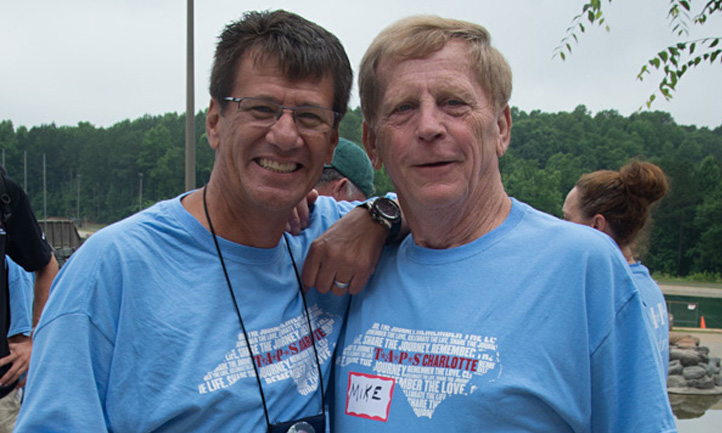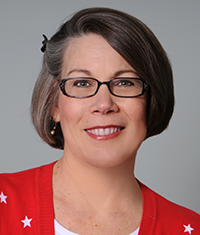Vacations, Who Needs ‘Em?
Author: Betsy Beard
When our son died, there were so many details and arrangements vying for attention I couldn’t begin to comprehend all the changes that would follow. At some point in the next year or so, one of those changes surfaced: the way I felt about, planned for, and took vacations. Many survivors have found vacationing to be problematic, so as we head into the warmer months let’s give some thought to the who, what, when, where, why, and how of vacationing.

Why?
In the early days, it may be difficult to consider going somewhere to have fun. For some survivors, it may be impossible to think of enjoying a vacation, even after many years. For others, it is a welcome respite from grief. How do we find a reason to travel again? Each of us will have a different approach.
For surviving fiancée Ellen Andrews, a vacation was helpful. "I chose a place I had never been before so I could be away from people asking questions and having that pitying look on their faces. I just needed to get away."
Allowing time for reflection was surviving mother Marcia Tomlinson's goal. "For two years I zipped myself into a fraud suit every day, putting on a face as someone in control, marvelously strong, and totally put together," she said. "But I was a complete fraud." She wanted time away to re-think who she was now.
Honoring her hero's vision factored into surviving spouse Sarah Greene's decisions. She wanted to travel to places they had never been able to visit, but had dreamed of. It allowed her to honor her husband, fulfill his vision of seeing other parts of the world, and to see the world for herself.
How?
Sometimes it's hard to figure out where to start. A first step could be taking a day trip or planning a weekend away. This affords you the option of returning to your comfort zone sooner. It also allows you a shorter time frame for attempting the new roles you may be assigned, particularly if you are a surviving spouse with young children.
There's a learning curve on how to travel when you are the sole event planner, security guard, and tour guide, according to surviving spouse Carole Hilton. Now ten years out from her loss, she enlists the aid of her children in planning vacations. "I try to encourage activities together whenever I can," she said. "Since they are involved in planning, they enjoy it also."
General guidelines that apply to other areas of processing your grief also apply to taking vacations. Be gentle with yourself. Give yourself extra time to accomplish goals. And allow yourself some down time and some time to grieve.
Who?
One of the first considerations is to plan who will accompany you on vacation. The only thing that is certain is that your deceased loved one will not be packing a bag or helping with the driving. Given that he or she can't be with you, it's important to consider whether you prefer to spend time alone, travel in a pre-arranged group, or visit a place together with family.
Will the vacation include young children? Is there another adult who can accompany you to help out? If you plan to include friends or extended family, it's a good idea to discuss the topic of your deceased loved one at the beginning of the time together. You need to let others know if it's a comfort or a hindrance to talk about him or her at this time.
Marcia spent some of her time with family two years after the loss of her son and reported that most of them enjoyed her visits, urging her to return. However, she said, "Some were uncomfortable with me as I am now, and I doubt I'll be invited to return. It's interesting how that's now okay with me."
And what about grief? In those first few months and years, it somehow manages to travel with us, regardless of who else is on the vacation. It might be wise to plan and pack for it: an extra box of tissues, chocolate, reading material, and journaling supplies.
What?
Once you decide who will be participating in the vacation, you can move forward in deciding what you want to do. You may find comfort and connection in doing something your loved one would have enjoyed. Or you might want to try something entirely different, knowing that your loved one would likely want you to continue to enjoy life. You are, after all, his or her legacy.
Janet, surviving mother of Steven, said, "After his death, I planned the vacation of a lifetime for my granddaughter, daughter, and myself: a seven-day Disney cruise in his memory. It brought back happy memories of his visits to Disneyland as a child."
Marcia found purpose in volunteering. From her starting point at the TAPS National Military Survivor Seminar in Virginia, she branched out and attended community suppers, stuffed food bags for the homeless, and talked to seniors on park benches, all while permitting herself "to remain exposed emotionally, encouraging feelings to enter."
When?
There is no correct answer for when you will be ready to vacation again. Keep in mind, though, that no matter how soon you go or how long you wait, it will be another "first." Survivors vary greatly in feeling that the time is right, so you are your own best judge of when you are ready.
Carole said, "The first year or so after my husband died, I discovered that vacations and time off from school created a lot of anxiety." Her children were very young at the time and she didn't like to have unscheduled time for them.
Sarah shared that on the first anniversary of her husband's death, she took the kids to the beach to learn to surf. "I didn't want my kids to think I was disrespecting their dad," she wrote. "But I explained that their dad would want us to get out there, enjoy life, and do new things. It would be a way to honor him." You can read about it in Sarah Greene's on the TAPS blog.
Where?
Whether we go to new uncharted territory or revisit places we enjoyed with our loved ones is something only we can determine for ourselves. Some feel they can't put themselves through the pain of visiting a place they had enjoyed in the past. Others are comforted by it, knowing their loved ones once walked that same ground. Still others blend the two ideas.
The Lanes haven't been back to the same place they took their son and daughter when they were younger, but surviving mom Carol said they still go to the beach. It's a different location, now, chosen by their daughter.
The McLendons have decided to explore America. "Last year we took a trip to the East coast and explored several hundred miles of Atlantic coast," said surviving mom Mary-Ann. They plan on doing the same thing this year, but in a different part of the country.
TAPS Seminars and Retreats
After Brad died, the idea of enjoying anything was beyond my ability for a long time. And I didn't feel safe traveling to places where no one would understand us. Our only travel plans in those first years were to attend military memorial events or participate in the annual TAPS National Military Survivor Seminar. Later, as TAPS introduced regional seminars and therapeutic retreats, we attended those as well, knowing we would be in good company, travel to new and different places, try something new, enjoy the benefits of outdoor activities, and get a new perspective on life and grief in our time away from home.
Whether you are just starting out on your grief journey or are years past the date of the death, attending TAPS events may be just what you need this year.

 By Betsy Beard, Surviving mom of U.S. Army SPC Bradley S. Beard: Betsy Beard served as the editor of TAPS Magazine for seven years in addition to volunteering as a peer mentor, care group facilitator, and national workshop presenter. In that time she authored a number of TAPS publications and Quick Series Guides, as well as the award-winning children's book, Klinger: A Story of Honor and Hope and many articles for TAPS Magazine. Betsy has been published in Living with Loss publications and various newspapers. She currently is a freelance book editor and serves as the awards director of Military Writers Society of America. She lives in North Carolina with her husband, Randy.
By Betsy Beard, Surviving mom of U.S. Army SPC Bradley S. Beard: Betsy Beard served as the editor of TAPS Magazine for seven years in addition to volunteering as a peer mentor, care group facilitator, and national workshop presenter. In that time she authored a number of TAPS publications and Quick Series Guides, as well as the award-winning children's book, Klinger: A Story of Honor and Hope and many articles for TAPS Magazine. Betsy has been published in Living with Loss publications and various newspapers. She currently is a freelance book editor and serves as the awards director of Military Writers Society of America. She lives in North Carolina with her husband, Randy.